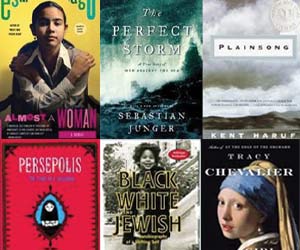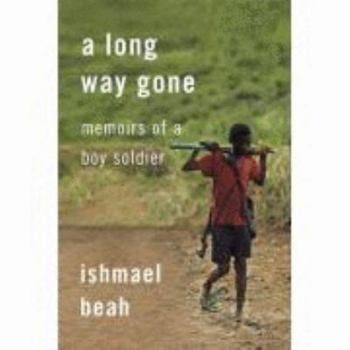A Long Way Gone: Memoirs of a Boy Soldier
Select Format
Select Condition 
Book Overview
In the #1 New York Times bestseller, A Long Way Gone, Ishmael Beah tells a riveting story: how at the age of twelve, he fled attacking rebels and wandered a land rendered unrecognizable by violence.... This description may be from another edition of this product.
Format:Paperback
Language:English
ISBN:1553652991
ISBN13:9781553652991
Release Date:January 2007
Publisher:Douglas & McIntyre
Length:229 Pages
Weight:0.95 lbs.
Dimensions:21.6" x 15.2" x 15.2"
Customer Reviews
9 ratings
Fascinating, frightening, compelling.
Published by A Long Way Gone, Memoirs of a Boy Soldier , 1 year ago
Got most of my original info about Sierra Leone from BBC, but this book, truth telling time, scary. Easy read, hard to comprehend the reality of it all. Not for everyone, but definitely a must read. Here in the United States, we really don't know.
Sierra Leone's shame
Published by Janz Adventure , 2 years ago
This is a sad tale told from a child soldier's perspective about Sierra Leone's civil war.
A good read for anyone from high school through adulthood.
A heartfelt story about a horrible war seen through the eyes of a boy
Published by Sarah K , 2 years ago
Definitely a book everybody should read! This was a fantastic book! I couldn’t put it down, curious to know what happened next and how Ishmael made it out. This story will break your heart and crack it wide open. I was moved to tears more than once.
Living in the U.S., it was eye-opening to see what war-torn Africa looked like from the point-of-view of someone that lived it. It is graphic and can be hard to read, but it is definitely worth it.
Books were fine just not clean.
Published by Wesley Cook , 4 years ago
Books arrived today. They are fine for school books but I mean come on you could have at least wiped them off. One was sticky and nasty from finger prints. I mean COVID! Jeez.
Heartbreaking but a must read.
Published by Mommanon , 4 years ago
I put this book down many times because I was so filled with sadness that anyone could live through this horrible war. I was determined to read it through and I did. I think it should be a must read in high schools or colleges to make this generation of young people understand some of the hatred and horror in history. To also understand how fortunate they are to live in the USA
A story that needed to be told
Published by Thriftbooks.com User , 17 years ago
You might not be able to read this book if you didn't know it had a hopeful ending. The violence is unstaged, described in a matter-of-fact way that gives it a haunting quality; wounds bleed, women scream, babies are burned in their cribs, grown men are shot after being tortured. And it is violence perpetrated in many cases by boys, young teenagers who in their own culture are usually not considered old enough to date or wise enough to make tough decisions. Ishmael Beah was born in Sierra Leone and grew up in a time of relative stability, before open rebellion began. One day he and his close buddies went to a nearby town to enter a music contest. They'd been listening to rap, imitating the poetic lyrics and the dance moves. They had a couple of home-recorded cassette tapes. While they were away, rebels swept into their home village, killing many inhabitants and forcing the rest to flee. Everyone disappeared from Ishmael's home in a few short hours, and he was never again to see most members of his close family. With no preparation, he was cut off from the life he had known and forced, with his companions, to begin a long period of constant flight, near-starvation and terror. The boys knew that their time was limited. The rebels were recruiting boys to fight, raping the young girls and enslaving the elders. They were stealing all usable items and all food, burning the villages as they left. The army was likewise recruiting boys, after men were slain by rebel forces. Boys so young as to be barely able to carry a weapon were given AK-47s and told to avenge their family's deaths. They were drugged with marijuana and cocaine until their minds were as ragged as their clothes, and sent out to kill. After living from day to harrowing day, Ishmael was forced to join the army. He not only shot many boys and men on the enemy side, but prided himself on being able to cut throats quickly and efficiently as part of a contest staged by the army officers. Such exercises toughened the children and inured them to the evils they were both witnessing and perpetrating every day. By chance, Ishmael was among a group of boys who were taken out of the army ranks and rehabilitated, slowly, by UN and other workers who kept telling their orphan charges, "What you did was not your fault." It took many months for Ishmael to understand and begin to believe this. At first he fought cynically and sometimes savagely against his benign captors, initially in the throes of drug withdrawal and then gripped by insane rage and a sense of powerlessness. At least as a soldier Ishmael had been esteemed a man and given responsibility. It was hard to become a boy again, to obey the kindly orphanage staff. It was harder to believe that his life had meaning or that there might be reason to hope for future happiness. After a long series of reunions and a fortuitous visit to the UN in New York, Ishmael was adopted by an American aid worker and given the chance to finish high school and co
Astonishinly introspective and honest!
Published by Thriftbooks.com User , 17 years ago
This is an extraordinary memoir by a young man who has lived and seen the worst of humanity and managed to survive and become a better man for all the tragedy, violence, horror and degradation he was forced to witness as a 12 year old boy. I can see this as required reading in high schools across the country. It is not only that good, it is that important. The writing is honest, straight forward, painfully introspective but never self pitying. Truly an amazing story, and a history lesson we all need be reminded of now and again.
Riveting, Heartbreaking, Horrifying, Inspiring
Published by Thriftbooks.com User , 17 years ago
There are, according to UNICEF, over 300,000 children employed as soldiers in various wars around the world. Ishmael Beah, author of this simple but eloquent memoir, was one of them. His powerful and disturbing book shows the full range of humankind's capacity for good and evil. His direct and unadorned language, and the contrast he draws between his happy childhood and the hellish nightmare of a savage civil war in which he was compelled to commit atrocities, make his narrative truly spellbinding. His account is also a testament to the revivifying power of love, which he found after UNICEF workers saved and helped rehabilitate him. My only criticism is that this book ends too abruptly, with him leaving Sierra Leone for Guinea. From the book jacket, it is clear that Ishmael Beah accomplished much with his life since leaving Africa. I would like to have read more about his life in the United States. I hope he writes again. This account of a child at war is sad enough to break your heart, but it is inspiring to know that Ishmael has survived. I hope someday no children will have to fight in wars. Better yet, I hope someday no adults will either.
I admire his resilience
Published by Thriftbooks.com User , 17 years ago
A Long Way Gone was a remarkable book. The narration is divided into three parts--before the war, being a soldier, and learning to become human again. The LL Cool J and Run DMC references surprised me because it showed just how far-reaching music (and media) can be. Sadly, the opposite is not true: little media attention was (is) given to the plight of child soldiers around the world. I hope this book will start the conversation. I was struck, and almost disturbed, by the matter-of-fact tone Beah used to describe the atrocities he committed, but his overall linguistic elegance made the descriptions of his travels and the reflections on his life uplifting by the end. How he was able to "rehabilitate" himself after living that surreal life demonstrates his strong sense of self. The book ends somewhat suddenly, but then, Beah's life story is still unfolding at age 26. This is a stark, but beautiful, narrative.
A Long Way Gone. Memoirs of a Boy Soldier Mentions in Our Blog

23 Years of the Alex Awards
Published by Ashly Moore Sheldon • December 21, 2020
Have you heard of the Alex Awards? Established in 1998, they celebrate books written for adults that have special appeal for younger readers, aged twelve to eighteen. These intergenerational, or crossover, books can serve as wonderful connection points between parents and teens.






